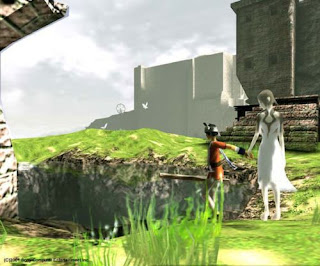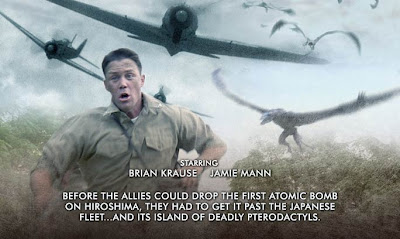
I’ve just finished playing Ico.
It’s a game for the PS2 in which you have to escape from a castle – and take your companion with you. The game is beautifully drawn, and instead of music features a soundtrack of ambient sound: the wash of waves on cliffs, gulls crying on the wing.
The light in the castle is from a bright summer sun, washing out the picture, exposing the crumbling stone and cliffs on which the castle is built. If you’ve got a PS2 I highly recommend you pick a copy up.
But what I actually want to talk about is the storytelling in the game, and how it’s different to that in any other medium, and shows just what you can do with writing in a game.
Of necessity, this post is going to contain spoilers.
A little background: You play Ico, a twelve-year-old boy with horns growing from his head. The superstitious villagers where you grew up believe that your deformity brings bad luck to the village – so they take you to a castle and lock you alive in a coffin to die.
Escaping from the coffin, you find a woman in a cage – Yorda. Glowing luminously, Yorda doesn’t seem quite human.
To complete the game, you must escape the castle, taking Yorda with you. Slightly difficult, as she is not as hardy as you – she can’t jump, or climb chains. Most of the game is involved with trying to clear a route that Yorda can take through the castle.
You investigate areas, climb almost sheer cliffs and towers – it’s not a game for the vertiginous – exploring the castle to find a route for Yorda. To get her to follow, you hold her hand as you lead the way, or call to her in your own language: On-swa! On-swa! for her to come and join you.
She can leap small distances if you call her across – and you catch her arm and draw her to safety.
If you leave her alone for too long, creatures made of black smoke will appear, and drag Yorda into the darkness. If this happens – and you can’t get back to her quickly enough to fight them off – the game is over.
Now to the storytelling.
The first reason why Ico stands out is that this isn’t about you. In most games, you fight and win-or-lose. If your character dies, it’s back to a save point and start again.
In Ico, you lose if you can’t protect Yorda. The game is all about saving her – not about you at all.
As you guide Yorda through the castle, you feel protective of her in a way that you don’t in, say, a first-person shooter. If the Master Chief falls in Halo, it’s just: Oh well, better respawn.
What Ico does is introduce a new dynamic to this – you haven’t just lost your own life, you’ve failed to protect Yorda. She’s helpless without you to guide her, and defend her from the darkness.
The emotional connection you build with Yorda is defined by the gameplay itself in every moment that you play – and is thus more emotionally real to you as a player than Master Chief’s connection with the Arbiter, or Jak’s with Daxter.
This emotional thread runs throughout the game – every action you take is about helping a person other than yourself.
There are two major sequences, both towards the end of the game, which build on the emotional connection built between the two of you over the past dozen or so hours.
It seems that you’ve escaped the castle. The bridge to the mainland has been opened and you cross… But then the bridge starts to break apart again.
And Yorda’s on the wrong side, back at the castle.
And the two sides of the bridge are moving apart.
And before I knew what I was doing I’d turned Ico around and ran back to Yorda, because, dammit, she was my responsibility and I was going to look after her, but the bridge is moving apart and there’s no way to make it across but it’s too late to think and you run and you leap….
…and you miss…
…and Yorda reaches down and grabs your arm, saving your life in the same way that you’ve saved hers so many times before.
And the experience is visceral.
The second sequence is at the very end of the game. Yorda’s not well – paralysed and trapped – and the monsters are attacking.
Waves of them. More than you can count. And they keep attacking, three or four at a a time, trying to get to Yorda and you’re swinging your sword, destroying them, trying to protect her, but every time you hit one and it dissolves into insubstantial smoke another two take its place.
And all I could think was this: You’re not going to take my friend.



